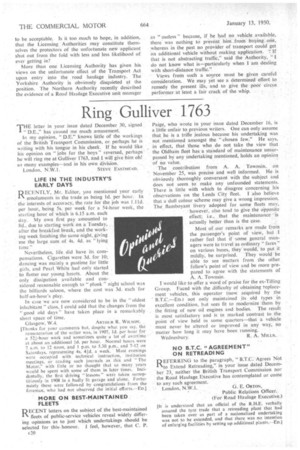Ring Gulliver 1763
Page 58

If you've noticed an error in this article please click here to report it so we can fix it.
THE letter in your issue dated December 30, signed I " D.E.," has caused me much amusement.
In my opinion, " D.E." knows little of the workings of the British Transport Commission, or. perhaps he is writing with his tongue in his cheek. If he would like his opinion on jobs for the boys" reversed, perhaps he will ring me at Gulliver 1763, and I will give him oh! so many examples—and in his own division.
London, NW.!. STEVE EASTMEAD.
LIFE IN THE INDUSTRY'S EARLY DAYS
RECENTLY, Mr. Editor, you mentioned your early emoluments in the trade as being Id. per hour. In the interests of accuracy, the rate for the job was 1.1 Id. per hour, being 5s. per week for a 54-hour week, the starting hour of which is 6.15 a.m. each day. My own first pay amounted to gd., due to starting work on a Tuesday, after the breakfast break, and the working week finishing the same night, giving me the large sum of 4s. 4d. as "lying time"
Nevertheless, life did have its compensations. Cigarettes were 3d. for 10; dancing was mainly a pastime for little girls, and Pearl White had only started to flutter our young hearts. About the only dissipation available and considered reasonable enough to " plunk" night school the billiards saloon, where the cost was 3d. each half-an-hour's play.
In case we are now considered to be in the "oldest inhabitant" class, I could add that the changes from the "good old days" have taken place in a remarkably short space of time.
Glasgow, W.4. ARTHUR R. WILSON. was for
[Thanks for your comments but, despite what you say, the remuneration of the writer was, in 1907. Id. per hour for a 524-hour week and sometimes quite a lot of overtime at about an additional id. per hour. Normal hours were 7 a.m. to 12 noon, and 1 p.m. to 5.30 p.m.. and 7-12 on Slturdays, representing 4s. 4,1d. a week.. Most evenings were occupied with technical instruction, institution meetings, or reading such journals as this and "The Motor," with little or no thought that so many. years would be spent with some of them in later times. Inci dentally. the first -driving " lessons " were taken surreptitiously in 1908 in a badly lit garage and alone. Fortu
nately these were followed by congratulations from theforeman, who had not observed the initial efforts.--Eal
MORE ON BEST-MAINTAINED FLEETS
RECENT letters on the subject of the best-maintained fleets of public-service vehicles reveal widely differing opinions as to just which undertakings should be selected for this-honour. I feel, however, that C. P. Paige, who wrote in your issue dated December 16, is a little unfair to previous writers. One can only assume that he is a trifle jealous because his undertaking Was not mentioned amongst the "chosen few," He says, in effect, that those who do not take the view that the Oldham fleet has a standard of maintenance unsurpassed by any undertaking mentioned, holds an opinion of no value.
The contribution from A. A. Townsin, on November 25, was precise and well informed. He is obviously thoroughly conversant with the subject and does not seem to make any unfounded statements. There is little with which to disagree concerning his observations on the Leeds City fleet. I also believe that a dull colour scheme may give a wrong impression. The flamboyant livery adopted for some fleets may, however, also tend to give the o-Pposite effect; i.e., that the maintenance is actually better than is the case.
Most of our remarks are made from the passenger's point of view, but :I rather feel that if 'some general Managers were to travel as ordinary " fares " on various buses, they would, to put it mildly, be surprised. They would be able to see matters from the other fellow's point of view and be more prepared to agree with the statements of A. A. Townsin.
I would like to offer a word of praise for the ex-Tilling Group. Faced with the difficulty of obtaining replacement vehicles, this operator (now acquired by the B.T.C.—En.) not only maintained its old types in excellent condition, but sees fit to modernize them by the fitting of new oil engines and bodies. The result is most satisfactory and is in marked contrast to the point of view held in sortie quarters—that a vehicle must never be altered or improved in any way, no matter how long it may have been running.
Wednesbury. R. A. MILLS._ NO B.T.C. "AGREEMENT" ON RETREADING
REFERRING to the paragraph, " B.T.C. Agrees Not to Extend Retreading," in your issue dated December 23, neither the British Transport -Commission nor the Road Haulage. Executive has contemplated or come to any such agreement.
London, N.W.I. G. E. ORTON, Public Relations Officer.
(For Road Haulage Executive.)
[It is understood that an official of the R.H.E. verbally assured the tyre trtde that a retreading plant that had been taken over as part of a nationalized undertaking was not to be extended, and that there was no intention of enlarging facilities by setting up additional plants.—ED.]




































































































